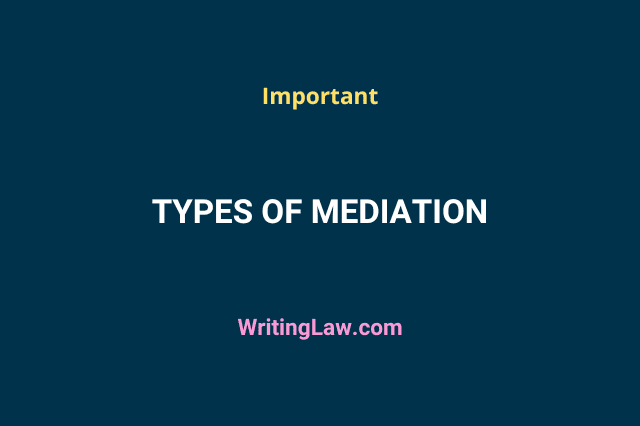
There are various types of mediation. Each offers unique advantages and considerations, allowing parties to choose the approach that best suits their needs, preferences, and the nature of the dispute.
By understanding the distinctions between these mediation approaches, parties can make informed decisions to effectively address their disputes while considering their specific needs and circumstances.
In this article, you will learn about the various types of mediation and a brief explanation for each..
1. Civil Mediation
Civil mediation involves resolving disputes between individuals, organisations, or entities in civil matters outside of court. It encompasses many disputes related to contracts, property, personal injury, employment, and family matters like divorce and child custody.
2. Commercial Mediation
Commercial mediation focuses on resolving business-related disputes, such as contract disputes, partnership disagreements, corporate conflicts, and disputes between businesses and consumers. It aims to facilitate efficient and cost-effective resolution of commercial disputes to preserve business relationships and avoid litigation.
3. Online Mediation
Online mediation, also known as e-mediation or virtual mediation, is conducted entirely or partially through digital platforms or communication tools. It allows parties to participate in mediation sessions remotely, making it convenient for parties located in far-off places who are unable to attend in-person sessions.
4. Court-Annexed Mediation
Court-annexed mediation refers to mediation programs or processes established within the court system to facilitate the resolution of disputes before or during litigation. Courts may refer cases to mediation to alleviate caseloads, promote settlement, and reduce the burden on the judicial system.
5. Community Mediation
Community mediation programs are community-based initiatives that provide mediation services for disputes within local communities. These programs often address neighbours, landlord-tenant, workplace, and interpersonal conflicts. Community mediators are trained volunteers or professionals who help parties resolve disputes amicably.
6. Private Mediation
Private mediation involves parties voluntarily engaging a mediator to resolve their dispute outside the court system. It allows parties to have greater control over the mediation process, including the selection of the mediator, scheduling of sessions, and confidentiality provisions. Private mediation is often chosen for flexibility, privacy, and customisation options.
7. Med-Arb (Mediation-Arbitration)
Med-Arb is a hybrid dispute resolution process that combines mediation and arbitration elements. Initially, parties attempt to resolve their dispute through mediation facilitated by a neutral mediator. If mediation is unsuccessful, the process transitions to arbitration, where an arbitrator renders a binding decision to resolve the dispute.
- What Is Misappropriation of Trade Secrets and Its Defences? - 15th May 2024
- 7 Important Types of Mediation Briefly Defined - 14th May 2024
- Whirlpool India vs Videocon Industries – Case Explained - 13th May 2024







